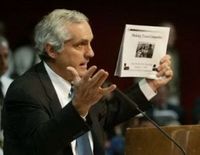State senator blasts 'inequitable' school bonus plan
April 2, 2008
Forcing property-poor school districts, such as Fort Bend and Pasadena, to help finance a state bonus pay program for superior teachers "is illegal and inequitable," Sen. Eliot Shapleigh, D-El Paso, contends in a letter to Education Commissioner Robert Scott.
Written by Gary Scharrer, San Antonio Express-News

Sen. Eliot Shapleigh
Forcing property-poor school districts, such as Fort Bend and Pasadena, to help finance a state bonus pay program for superior teachers "is illegal and inequitable," a state senator contends in a letter to Education Commissioner Robert Scott.
Texas lawmakers created the $148 million District Awards for Teacher Excellence program last year to help schools award teachers for improving student achievement. Scott placed a 15 percent local match requirement on the awards, which start at $3,000 per teacher. The statue does not require school districts to leverage the state grants with matching money.
"By requiring property poor school districts to raise a 15 percent match, you place districts such as all of the ones I represent at a significant disadvantage," Sen. Eliot Shapleigh, D-El Paso, wrote in his letter to Scott. He noted that some property poor-schools in his district have nearly $800 less per student than property-rich schools.
"All across Texas, teacher quality is the issue," Shapleigh said in an interview. "So often, low-performing schools have last choice when it comes to (hiring) teachers, so teacher pay can improve teacher quality. And property-poor school districts need a level playing field. With the 15 percent rule, they are at a disadvantage from the start."
The commissioner has not yet responded to Shapleigh.
Only one-third of the state's 1,039 school districts have chosen to participate, even though Scott has told school officials they could meet the match requirement with an in-kind contribution or request a waiver. None have sought such a waiver.
"We're not trying to disadvantage any school," Scott said.
But property-poor school districts view it as a burden, and Shapleigh said he expects school districts will file a lawsuit if the problem is not resolved.
"It's a major issue because it continues a trend of the way things have been done in the past," said Wayne Pierce, executive director of the Equity Center, which represents poor and mid-wealth school districts.
San Antonio Independent School District officials want to reward teachers for their work, but did not apply for the bonus pay "because our district is not in a financial position to provide the 15 percent match," deputy superintendent Betty Burks said, adding that it would have cost the district well over $100,000 to get the bonus pay for the district's 3,500 teachers.
San Antonio school administrators were unaware they could request a waiver or offer in-kind contributions.
"We went by the first round of information and didn't pursue it after that. It's unfortunate that some districts have more information than others," Burks said.
San Antonio's largest school district, Northside Independent School District, opted to participate only after learning that the Texas Education Agency would allow in-kind expenditures to count as the district's match, Northside Superintendent John Folks said.
Northside will get $4.5 million for the teacher bonus pay program after making $561,636 worth of in-kind contributions.
Leaders in the Pasadena school district — a property-poor district in the Houston area — said they opted into the bonus program because of the potential educational benefits. The 49,000-student district must provide a more than $338,000 match to receive its $2.7 million grant.
"We wanted the incentive plan to be a solid, instructionally based plan that would truly stretch our staff beyond expectations," Superintendent Kirk Lewis said. He said the in-kind allowance made it possible.
Despite the financial concerns, the school board for the Fort Bend district, one of the largest property-poor systems in the Houston area, voted this week to seek its $3.7 million grant. They plan to spend the money at 13 elementary and middle schools starting in 2008-09, officials said
The Texas State Teachers Association raised the equity issue when the education agency established the local match requirement.
"We think it is a major factor in why so many districts have opted out of the program," association spokesman Richard Kouri said.
Houston Chronicle reporter Jennifer Radcliffe contributed to this report.
![]()
![]()
Related Stories
![]()
Fair Use Notice
This site contains copyrighted material the use of which has not always been specifically authorized by the copyright owner. We are making such material available in our efforts to advance understanding of environmental, political, human rights, economic, democracy, scientific, and social justice issues, etc. We believe this constitutes a "fair use" of any such copyrighted material as provided for in section 107 of the US Copyright Law. In accordance with Title 17 U.S.C. Section 107, the material on this site is distributed without profit to those who have expressed a prior interest in receiving the included information for research and educational purposes. For more information go to: http://www.law.cornell.edu/uscode/17/107.shtml. If you wish to use copyrighted material from this site for purposes of your own that go beyond "fair use", you must obtain permission from the copyright owner.